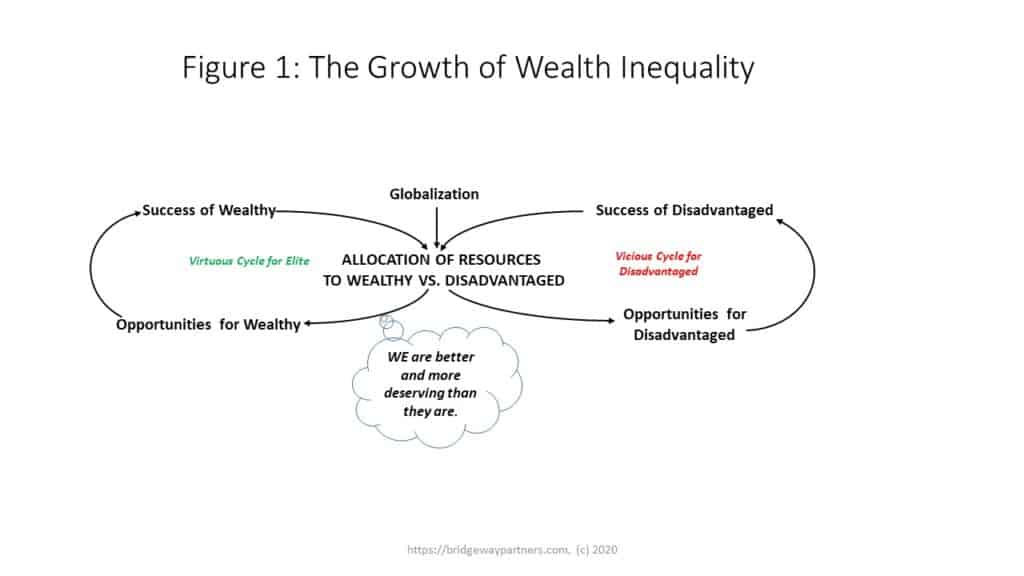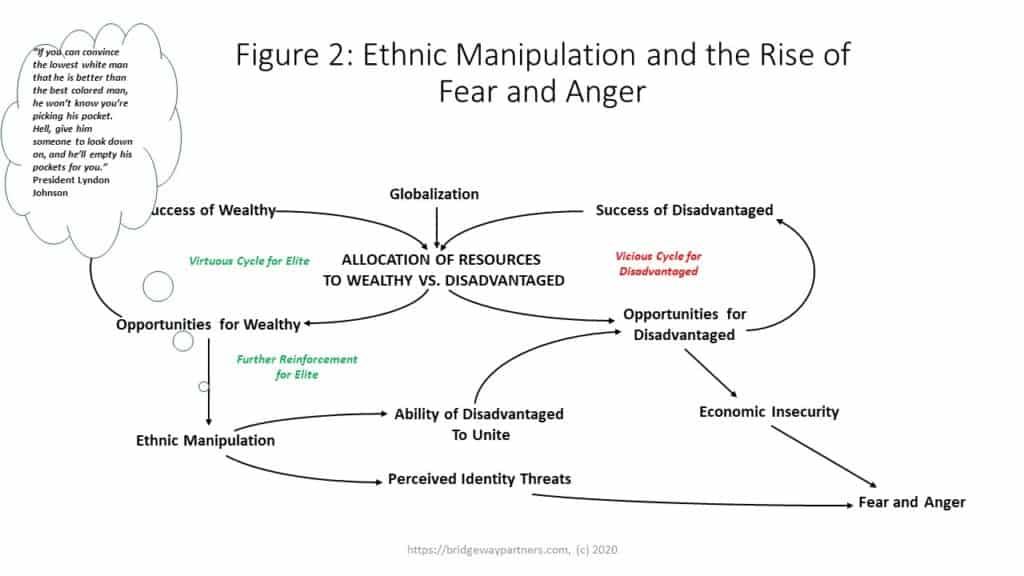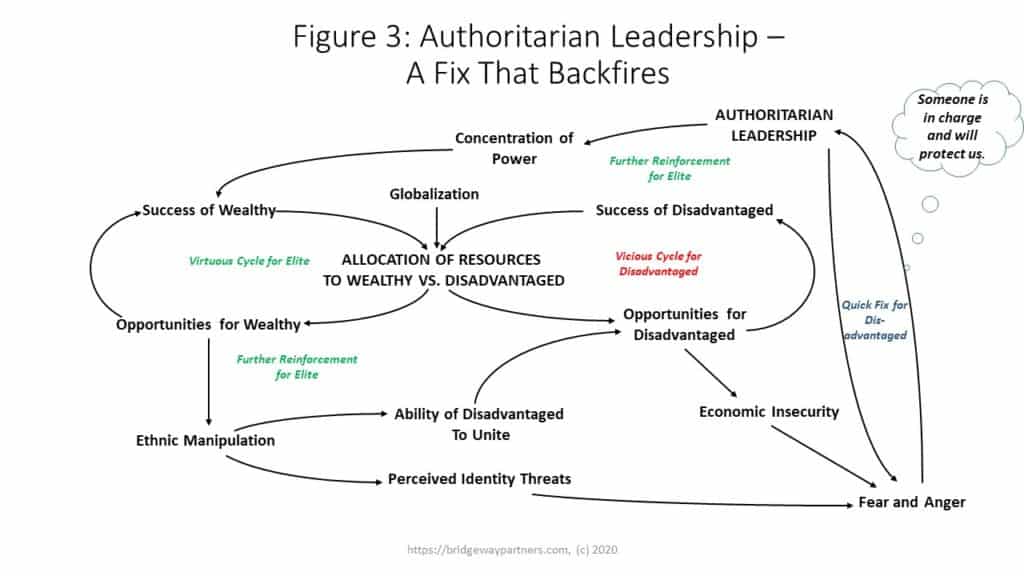Why is authoritarian leadership taking root in developed countries, even those with long democratic traditions? What can we do to shift this trend?
We can get useful answers to these questions by offering a framework that involves three major factors and their inter-connections. The factors are wealth inequality, ethnic manipulation, and authoritarian leadership. Several systems maps support this perspective by providing visual tools that reinforce the insights.
The Growth of Wealth Inequality
We start with a dynamic that is very common in all societies, not just capitalist ones. It’s called “Success to the Successful”, i.e. the rich get richer and the poor get poorer. One of the catalysts of this dynamic over the past four decades has been globalization. Globalization has enabled people at the top of the pyramid, not just in the US but also in other countries around the world, to benefit from an expanding economic pie. However that pie is not being equally distributed. The elites in various countries around the world benefit enormously from globalization. Other people are left scrambling to keep their heads above water as costs are driven lower and lower. This dynamic especially hurts manufacturing workers and others in developed nations who depend on jobs that can be exported to lower-cost countries.
The elites benefit over time from a feedback relationship described on the left side of Figure 1 below. People who start off with more resources get more opportunities. They are more successful because of these opportunities. They then use their success to get even more resources for themselves. On the other side of the coin, people who start off with fewer resources are less able to generate new opportunities. They are then less successful because they have fewer opportunities. As a result they are less able to tap into more resources. The disadvantaged are caught in a vicious cycle while the elites benefit from a virtuous cycle.

Many elites reinforce their virtuous cycle by assuming (as shown by the thought bubble on the diagram) that we are better and more deserving than those who are disadvantaged. People at the top often experience a sense of entitlement. There are also members of the elite who want to help the poor but fall into the trap of assuming they know what the poor need. Consequently they mistake giving to the poor with empowering them.
Ethnic Manipulation and the Rise of Fear and Anger
One way in which the wealthy retain power is through “ethnic manipulation”. They set poor people against each other on the basis of ethnicity or other identifiable differences. For example, President Lyndon Johnson, an extremely astute politician, was asked why poor white people, typically Republicans, regularly vote against what seems to be their economic self-interest. He responded, “If you can convince the lowest white man that he is better than the best colored man, he won’t know you’re picking his pocket. Hell, give them someone to look down on, and he’ll empty his pockets for you.”
Disadvantaged people are less able to unite to improve their economic status because of ethnic manipulation. If the disadvantaged are unable to unite, their ability to strengthen their economic opportunities declines further. The wealthy are able to increase their opportunities proportionally. We can see this dynamic in the success of union-busting campaigns and weakening of the social safety net in the United States over the last 30-40 years.
People who are vulnerable to ethnic manipulation perceive that their identity, their very right to exist, is being threatened. The word “perceived” here is deliberate since it doesn’t necessarily mean that the threats are real. For example, a white person who feels threatened by people of color or by immigrants is not necessarily in economic danger. In fact immigrant labor often creates new jobs for the dominant ethnic group. Whether the threat is real or perceived, people who believe their identity is being threatened feel afraid and angry. Beyond that, they feel greater fear and anger when they experience economic insecurity as a result of decreasing opportunities. These dynamics are shown in Figure 2 below.

Authoritarian Leadership: A Fix That Backfires
It is this fear and anger that leads to authoritarian leadership. Disadvantaged people, particularly from the dominant ethnic population, come to trust that someone is in charge, someone will protect them. The words used by participants at a recent Trump Presidential rally were, “He is our protector; he is our bodyguard.” These are very powerful attributes to be granted by one set of adults to another adult. Authoritarian leadership works in the short term in that it enables disadvantaged people who experience identity threats and economic insecurity to believe someone will take care of them.
However over time, authoritarian leadership increases the concentration of power. And that concentration of power plays right into the hands of those wealthy people who believe they deserve everything they have and more. So authoritarian leadership ironically reinforces the strength of economic elites and leads to an even deeper vicious cycle for the disadvantaged. See Figure 3 below.

What We Can Do
In summary, wealth inequality, ethnic manipulation, and authoritarian leadership are mutually reinforcing factors that tend to increase over time. In order to limit the growth of these factors, we can do the following:
- Redistribute existing resources from the elite to those who are disadvantaged
- Generate new resources and distribute them more equitably
- Encourage the elite to replace attitudes of superiority and entitlement with those of gratitude and generosity
- Empower ethnically diverse poor people and support them to see that they have common economic interests
The results are that we will have not only a more equitable society, but also one that is more sustainable economically, socially, and politically.
Note: This post is based on a panel presentation given by David Stroh at the 2020 International Leadership Association annual conference. Much of the material will appear in greater depth in his upcoming article in The Foundation Review, “Overcoming the Systemic Challenges of Wealth Inequality in the U.S.” Readers are also encouraged to read his recent blog post “How Wealth Inequality Compounds Racism” for further perspective.
